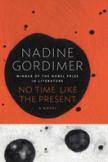After Apartheid
The Nobel laureate Nadine Gordimer examines the complexities and contradictions of life in post-apartheid South Africa in her most recent novel, No Time Like the Present. Through the lives of Steven Reed and Jabulile Gumede and their children Sindiswa and Gary Elias, Gordimer navigates the socioeconomic and political contours of South African realities that life in the new dispensation present: corruption, injustice, violence, inequality. The demise of the apartheid regime did not usher in a republic of virtue.
In the first half of the novel, Gordimer introduces the reader to the protagonists, their families and friends and South Africa. Steven and Jabulile met during the struggle. She, a black South African young woman, had been sent out of the country by her father in order to obtain a university degree—which in and of itself subverted both black and white cultural norms of the day. He, a white South African with a degree in chemical engineering, was putting that knowledge to use against the regime, aiding the cause by constructing bombs.
The two met in Swaziland during the struggle. This joining of black and white, through the experience of the struggle, made their lives acceptable in the post-apartheid period. Their children represent the future of the country: a blending of the old into the new.
The second half of the novel focuses on the choices the Reeds must make in a corrupt, violent and dysfunctional world. This middle-class couple struggles with the desire to develop the new South Africa, promoting democracy, the rule of law, economic justice for all and the desire to protect their children, shielding them from senseless acts of violence, providing them with a quality education, allowing them to embrace their cultural heritages so as to understand who they are as South Africans. The Reeds have to decide: do they stay or do they go? Do they remain in South Africa or emigrate to Australia?
The problems facing South Africa in the novel and the problems faced in contemporary society are one and the same: corruption, violence, inequality. Gordimer pulls no punches. She is highly critical of the current political leadership of the country, especially the president, Jacob Zuma, of the African National Congress, and the former leader of the A.N.C. Youth League, Julius Malema, who, earlier this year, was expelled from the party for sowing divisions. Zuma’s trial on charges of rape and corruption are woven into the narrative as a way to introduce the reader to Jabulile Reed, a lawyer, and also to introduce the reader to the fact that there are those, including Jabulile’s father, who believe the charges against Zuma were politically motivated. Gordimer’s characters fear that Malema, a brash young populist, might one day come to real political power, unleashing a reign of terror in the country.
To stay or to go? To help build the nation or to depart, leaving the nascent nation-state to fend for itself? What was the struggle for and why did one even participate in it, if one were only going to abandon the movement (the new state) at its time of greatest need? This is the heart of No Time Like the Present.
In a seamless narrative, Gordimer weaves the past with the present, the new with the old and the potential with the real. Modern South Africa is undergoing a transformation and Gordimer is presenting and representing that transformation for her readers. Its citizens are struggling to find a way to respect the past, as embodied by Jabu’s father with the future, her children, his grandchildren. What should be kept of the old: respecting one’s elders, honoring one’s ancestors and acknowledging cultural contributions? What should be embraced of the new: urbanization, gender equality and socio-economic opportunity? While the past informs the present, the future cannot be held hostage to that past. The potential of South Africa, Gordimer subtly presents, will be unrealized if the country does not face reality and deal with its problems, instead of fleeing from them. Should the Reeds migrate, they take the future, the potential and the hopes of South Africa with them. Those left behind are destined to repeat the past.
For the reader uninitiated in the ways of South African history, Gordimer’s work presents a challenge. The reader needs to know the political players of the African National Congress—from Albert Luthuli, the Noble Peace Prize-recipient in 1960, to Walter Sisulu, Oliver Tambo and Nelson Mandela, the Noble Peace Prize-recipient 1993, along with Jacob Zuma and Julius Malema. And some understanding of the current socioeconomic difficulties facing the country, including housing shortages, xenophobia, affirmative action hiring, H.I.V.-AIDS and educational deficiencies, would enhance one’s reading experience.
This review has been revised to reflect the following corrections:
Corrections
An earlier version of this review misstated the name of the President of South Africa. His name is Jacob Zuma, not Joseph Zuma. This review also misstated the name of the leader of the African National Congress Youth League. His name is Julius Malema, not Jacob Malema. The review has also been updated to reflect the following development: Earlier this year, Julius Malema was expelled from the A.N.C. for sowing divisions within the party.
This article also appeared in print, under the headline “After Apartheid,” in the October 22, 2012, issue.








